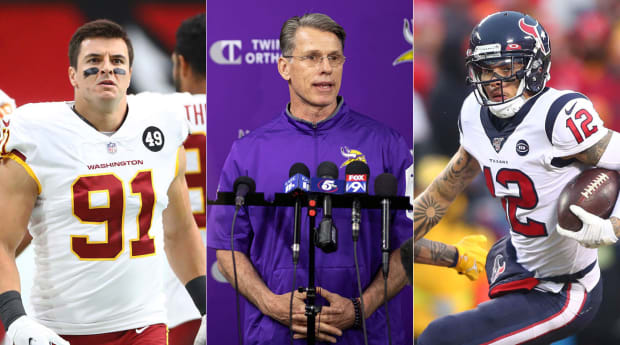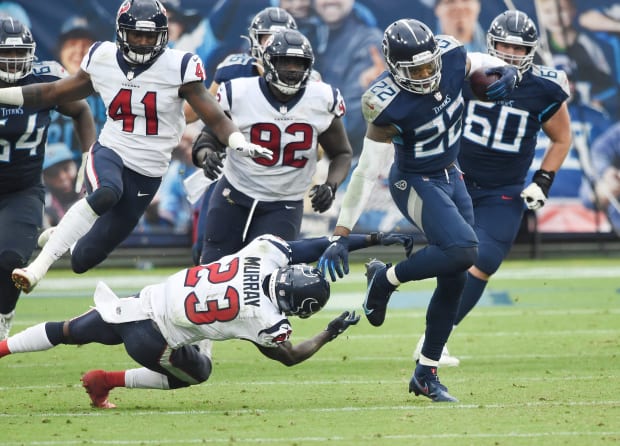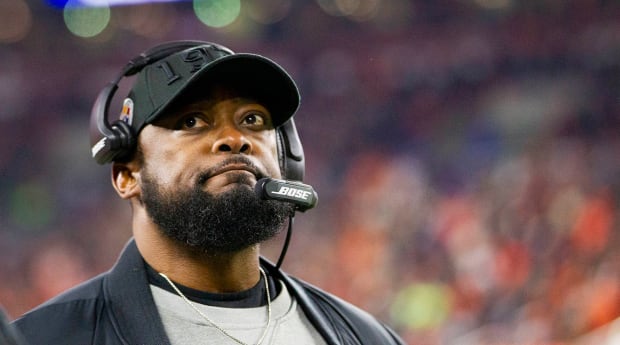The trade deadline is fast approaching, and deals are already being made. Here's what you need to know about the players that could be on the move and the ways the pandemic is making teams think about doing business.
The effects of the pandemic are being felt on a daily basis in NFL facilities—in how teams are practicing, how teams are meeting and how people are interacting. And they’ve been felt on a larger scale in testing procedures, quarantines and game postponements.
The really hard part? Even when this season is over, the pandemic won’t be done impacting the league. The trade deadline is 12 days away and only brings more proof of that.
Lots of factors will determine the level of activity over the next week and a half, but after spending time on the phone the last 48 hours, I know this much—the lingering effects of the pandemic on NFL economics will be big. The ongoing revenue shortfall will take a chunk out of the 2021 salary cap, which could fall from $198.2 million this year to $175 million next year, and could reverberate in 2022 and ’23, as well.
In real-life terms, this isn’t all that complicated. NFL teams have budgeted since 2013 with the expectation that the cap would leap $10 million annually. That, until now, has held to form—from 2014 to 2020, it went up by at least that much each year. That’s why, oftentimes, you see star players’ contracts built with cap numbers that slowly rise over the life of the deal, the bet being that while the numbers go up, the percentage of the cap a deal takes up will stay flat.
So what happens when the cap goes down? We’re seeing it now. Those contracts are becoming like cars on a five-lane highway that really should be six lanes, with a bottleneck visible ahead … and the road soon going down to four lanes.
Predictably, behind the scenes, there’s some scurrying to the exit ramps.
***
Week 7 is here, and we have a Thursday night barn burner between the Eagles and Giants coming—which means I’ll be tweeting about Travis Fulgham during the final presidential debate. So be prepared for that. Also, inside this week’s GamePlan …
• We’ve got a wrap up of the Titans’ COVID-19 situation and fallout.
• A look at a dice roll by the Chiefs, a potential Seahawks’ gamble, and what binds them.
• Power rankings!
But we’re starting with the trade deadline, and what figures to drive activity.
***

Even I was surprised when I looked this up (and thanks to the folks at Over the Cap for tracking this stuff diligently): 13 of the NFL’s 32 teams already have cap commitments exceeding $175 million for 2021. And four of those 13 are over $175 million in cap commitments again in 2022.
The Eagles and Saints are over $260 million for next year, while the Steelers, Rams and Falcons are over $200 million. Now, as a quarter-century of a salary-capped NFL has shown us, there are always ways around the cap—these teams aren’t going to fold or field teams full of undrafted free agents in the coming years as a result of all this. But they do have to plan ahead, and that’ll be a factor.
A very big factor.
So with that as the backdrop for what’s ahead, here’s a look at what I’m hearing …
• The Vikings are sellers—but they’re not holding a fire sale, per se. They’ve let teams know they’ll listen on anyone, which is how Thursday’s Yannick Ngakoue deal came about. They’re open for business on guys in contract years, and teams have asked on veteran TE Kyle Rudolph (who isn’t in a contract year) as well. Pat Elflein, a 2017 third-round pick who has been a disappointment, could be another name to watch, with lots of teams hungry for O-line help. And Tajae Sharpe is one more name that I’ve heard out there.
• One thing that should be mentioned, too, is that the Vikings are over $180 million in cap commitments in both 2021 and ’22, which means they have to be tactful even with the guys they plan to keep. And there’s an element of that thinking in the Ngakoue deal. Danielle Hunter is making $14 million per year, so if Minnesota was to sign Ngakoue to a deal north of $20 million per (which is almost certainly what it would’ve taken to keep him), there’s a good chance Hunter, who is out for the rest of the season, by the way, would’ve been circling back to the team for a correction on his contract.
• The Eagles have gotten a lot of calls on their players as well, which makes sense given how their season’s gone and where their cap is the next couple of years. Alshon Jeffery is very clearly available. There have been calls on tight end Zach Ertz, too, and Philly delaying a day or two on moving Ertz to IR raised some eyebrows—this year, you have to designate guys on IR as having major or minor injuries, and guys categorized as having minor injuries can’t be traded. The Eagles designated Ertz as a minor injury, so that’s that on him.
• Philly’s opponent Thursday night, the Giants, are open for business as well. Veterans Golden Tate and Kevin Zeitler are two names that came up pretty consistently with other teams. Tate’s contract and declining production could make him difficult to move for anything significant. Zeitler, on the other hand, might fetch a return based on, again, the crying need for experienced linemen across the league.
• Before the dismissal of Dan Quinn and Thomas Dimitroff, the Falcons had started to dip their toe in the water on selling parts, with former first-round pick Tak McKinley out there if another team wanted to look at a reclamation project at a premium position. Now? Atlanta’s plans are less clear, though it is giving off the vibe that it’d like to give Raheem Morris a shot with the current group and leave the big decisions up to whoever the next GM and coach wind up being.
• Along those lines, the Texans have also been a hard team for others to read. But Kenny Stills is in a contract year, and Will Fuller’s heading into his option year in 2021. Randall Cobb and Brandin Cooks could also have some trade value, given the skins those guys have on the wall and their relatively manageable contract numbers. My sense is the team will wait to see what happens Sunday against the Packers, then chart a path on any potential offloading of veterans.
• The Jets have let teams know they’re ready to deal. The question is whether there’s much of value there for other teams to flip draft capital for. Maybe Jamison Crowder? Maybe George Fant? Whatever a team might want, the Jets will listen.
• Speaking of listening, I’m told the Washington Football Team will be listening too, if teams call on their veteran players (which makes three of the four NFC East teams in this category). Two names that came up as I called around were edge defenders Ryan Kerrigan and Ryan Anderson. Obviously, Chase Young’s emergence has given the team flexibility there.
• The Bengals are another team in that category—John Ross has been available before and, per NFL Network’s Mike Garafolo, his agent turned the temperature up this week in asking for a trade. Veteran DE Carlos Dunlap is another player other teams have earmarked as available.
• Not all the teams open to moving players are in the dumps. Cleveland has a surplus at tight end with the emergence of rookie Harrison Bryant, so while former first-rounder David Njoku is not necessarily on the block, the Browns will field calls on him. The Niners have made available a receiver they once had high hopes for, in Dante Pettis. And with the emergence of Myles Gaskin in Miami, the Dolphins are willing to move veteran Jordan Howard.
And before we move on, there is a flip side to this and that’s whether teams will be willing (or even able) to take on big contracts from other teams. Remember, the big-ticket moves we’ve seen in recent years for guys like Laremy Tunsil, Jalen Ramsey and Amari Cooper were done with the acknowledgment that a long-term deal would eventually be part of the freight—and each of those guys wound up getting upwards of $20 million per year.
So having space this year will matter, as it always does. But so, too, will what these team’s finances look like over the next few years with the cap crunch coming.
Which, really, is just another of the weird new realities teams are dealing with in 2020.
***

POWER RANKINGS
1) Tennessee Titans (5–0): Regardless of what did or didn’t happen in Nashville over the last month on the COVID-19 front, what the Titans just pulled off was damn impressive. After being knocked completely off routine and out of their building, they blew out a good Buffalo team and outpunched a red-hot Deshaun Watson on a short week. And now they get a great chance to prove they’re the NFL’s best against the …
2) Pittsburgh Steelers (5–0): The Browns arrived in Pittsburgh firing on all cylinders and left scurrying to pick their teeth up off the field. The Steelers’ defensive front is imposing, their run game is formidable, and once Ben Roethlisberger and his newest set of young receivers find their stride, look out. The game in Nashville on Sunday is, without question, a heavyweight fight.
3) Seattle Seahawks (5–0): Do I feel bad about dropping the Seahawks a spot and having two teams leapfrog them, when all they did was enjoy a bye? Kind of. But as of this writing, I feel like Tennessee and Pittsburgh are more complete teams, hence the leapfrogging.
4) Kansas City Chiefs (5–1): One thing that was fun to watch on Monday night—Patrick Mahomes playing situational ball. Whether it was scrambling or making third-down plays off-schedule, the Buffalo game was the kind where you could see 15’s growing maturity as a quarterback. To boil it down, in a circumstance where the run game was going to be K.C.’s focal point, Mahomes seemed to know exactly what the Chiefs needed from him in every situation. And gave it to them.
5) Baltimore Ravens (5–1): Maybe their offense has taken a small step back from last year. But the defense looks like it’s stepping forward—or at least it did until the last few minutes of the game against Philly. At any rate, the Ravens are on their bye this week and host the Steelers next week, so we’ll know more about John Harbaugh’s crew in 10 days.
***
THE BIG QUESTION
What exactly happened in Tennessee?
If you thought we went from draconian penalties looming for the Titans to, well, a lot less than that pretty fast, I can’t blame you. And I do think there’s an explanation here.
The accusations flying around during the Titans’ shutdown were, to be sure, pretty heavy, and my sense is that led to a belief that the hammer was about to drop. Then the NFL and NFLPA went in, and what they found was something that was, if not acceptable, at least a little more understandable than whatever the rumor mill had people expecting.
So what did the NFL find? We reported on this a couple of weeks back, and we’ve got a little more detail now.
• There were inconsistencies in mask wearing. One source told me during the investigation that the Titans were “75 to 80%” compliant. The league has emphasized that isn’t good enough, but it also looks more like some being careless and having a false sense of security than any blatant rule-breaking.
• Contact tracing showed a high level of close contacts across the building for too many people, and too much gathering in places like the hallway, cafeteria and locker room. Careless? Sure. Sinister? Not really.
• The team didn’t communicate clearly enough to players that they weren’t to gather outside the facility during the lockout—and the players, as you’ve all seen by now, did wind up gathering for what amounted to off-campus captain’s practices. So this amounts to roughly the equivalent of what would be a “lack of institutional control” penalty in college football.
• On the flip side, the NFL found that the Titans did a really good job retrofitting their facility to handle COVID-19 protocols. And when it came to the investigation, Tennessee was completely cooperative, handing over all relevant documents and facilitating interviews with every player, coach or staffer that the NFL requested.
The result of all this will, in all likelihood, be a fine for the organization. No draft-pick penalty or forfeiture is coming, and fines for individuals are no longer being considered.
And there have been some changes in the aftermath of all this. Last week team captain Kevin Byard told me, as he and his teammates see it, the Titans have used their “lifeline” and there’s no more room for slipups. The team’s taking extra steps to try and make sure there won’t be.
The Titans added a second weight room in the facility, and a second portable locker room, and have gone so far as to remove tables from the cafeteria.
Is it weird all this has to be done? Sure it is. But these are weird times.
***

WHAT NO ONE IS TALKING ABOUT
Mike Tomlin’s connection to the news of the last week.
News Item No. 1: The Chiefs sign veteran RB Le’Veon Bell for $647,058.82 for the rest of the year (with $1 million in incentives).
News Item No. 2: The Seahawks are looming as the leader for suspended WR Antonio Brown, who could be reinstated as soon as Nov. 2.
Now, part of the story is where these guys are going, no doubt. The coaches on both teams have shown a willingness in the past to take on guys with checkered pasts, be it Pete Carroll rolling the dice on Percy Harvin or Bruce Irvin, or Andy Reid giving it a shot with Marcus Peters or Tyreek Hill. And both, in fact, gambled on Frank Clark at different points.
Because of all that, it’s hardly a surprise that either guy would buy low on Bell or Brown. Both know there’s talent there and, in getting them this way, they have the leverage to say, “Either you fall in line or you’re gone.”
But if we dig deeper here, consider this: Tomlin got a combined 14 years of high-end service from the two. He got 7,996 scrimmage yards and 42 touchdowns from Bell and 837 catches, 11,207 yards and 74 touchdowns out of Brown. And he did it while managing their outsized egos and personalities, with both of them together in the same locker room for five of those years.
My point? This is such a hugely overlooked part of Tomlin’s value and, frankly, the job description of the head coach.
Tomlin knows how to relate to and manage people at an incredibly high level. As a result, GM Kevin Colbert is able to cast a wider net in talent acquisition because the Steelers know he can handle players of all different kinds better than most. Which winds up being one reason why, year after year, the Steelers field one of the NFL’s most talented rosters.
Carroll and Reid have these qualities too, to be sure. But if you look at Tomlin’s track record, and who the Steelers have brought in over the years, and how it works in Pittsburgh vs. when those same guys go elsewhere, the work he’s done is pretty undeniable.
Something for you to chew on with the Steelers at 5–0, and maybe something for teams that’ll be looking for new coaches to chew on come January.
***
THE FINAL WORD
On this week’s podcast, we discussed the number of bad teams that are in the NFL right now, and some of the facts are staggering. Yeah, the Jets are the league’s only winless team, but there are nine more that have only a single win.
So why does that matter? I’d just keep an eye on COVID-19 trends with those teams. The last three months have been a lot for everyone to handle. Enough so to make you wonder whether, without the carrot of playoff contention around anymore in some cases, more than a few people league-wide will start letting their guard down.
That could wind up being a big problem for the league, because even if these teams aren’t playing relevant (to them) games down the stretch, they will be playing against teams that are. And we’ve all seen how this situation can wreak havoc on scheduling.
Which, of course, could create some pretty serious issues come December and January.